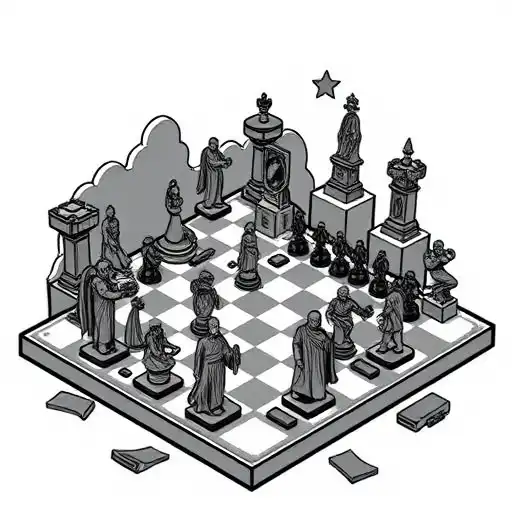
P566 - The Fascinating World of Tabletop Games and the Role of P566
Explore the exciting intricacies of tabletop games as we delve into their mechanics, history, and the noteworthy addition of P566.

The Fascinating World of Tabletop Games and the Role of P566
Introduction to Tabletop Games
Tabletop games have been a beloved form of entertainment for centuries, captivating players with strategic challenges, storytelling, and social interaction. These games encompass a wide variety of genres, including board games, role-playing games (RPGs), card games, and miniature wargames. Each category offers unique gameplay experiences that draw enthusiasts from around the globe.
A Brief History of Tabletop Games
The origins of tabletop gaming can be traced back thousands of years. Some of the earliest known examples include Senet, an Egyptian board game, and the Royal Game of Ur from ancient Mesopotamia. Over time, these simple games evolved into more complex formats, leading to classics like Chess and Go, which have endured through the ages.
In the 20th century, tabletop gaming experienced a significant renaissance. The introduction of mass-produced games like Monopoly and the revolutionary RPG Dungeons & Dragons paved the way for modern gaming culture. These games fostered creativity and strategic thinking, attracting a diverse range of players.
The Mechanics of Tabletop Games
Tabletop games are renowned for their diverse and intricate mechanics. Players often encounter games with complex rulesets requiring strategic planning, resource management, and tactical decision-making. Role-playing games, for example, allow participants to immerse themselves in fictional worlds by assuming the roles of characters in collaborative storytelling.
Card games such as Magic: The Gathering introduce strategic deck-building elements, where players customize their own decks to gain a competitive edge. Similarly, Eurogames focus on resource management and economic strategies, offering a challenging yet rewarding experience.
The Emergence of P566 in Tabletop Gaming
Recently, a new concept known as P566 has emerged within the tabletop gaming community. This innovation aims to enhance game design by integrating emerging technologies and interactive elements to elevate player engagement.
P566 represents a shift towards integrating digital components with traditional gameplay. For instance, augmented reality applications can be used to visualize game elements or provide real-time information directly to players. Such advancements increase immersion and accessibility, inviting a broader audience to appreciate the joys of tabletop gaming.
Tabletop Games as a Social Experience
One of the defining features of tabletop games is their ability to bring people together. Unlike video games, which often isolate players behind screens, tabletop games promote face-to-face interaction and foster social connections. Players sit around a table, sharing laughter and friendly competition as they navigate the intricacies of their chosen game.
With the integration of P566, players can anticipate even richer interactions. Augmented reality, for example, could allow players to create shared narratives or compete in cooperative modes more effectively. By enhancing the social aspect, tabletop games can further cement their place in the hearts of enthusiasts.
Innovative Titles Influencing the Tabletop Scene
The introduction of P566 into game design has inspired a slew of innovative tabletop titles. Games like Mansions of Madness and Chronicles of Crime blend digital applications with physical components, offering players rich, narrative-driven experiences. These games utilize apps to provide dynamically changing scenarios, ensuring each playthrough remains fresh and unpredictable.
As developers continue to embrace these emerging technologies, the potential for creating novel experiences within the tabletop realm appears boundless. This fusion of analog and digital elements holds the promise of captivating new audiences while retaining the core essence of traditional gameplay.
The Future of Tabletop Gaming with P566
The integration of P566 into tabletop gaming signifies a new era for enthusiasts. As technology advances, players can look forward to increasingly interactive and immersive gaming experiences. The potential for innovation is vast, offering opportunities to redefine gaming conventions and reach untapped audiences.
From evolving gameplay mechanics to cutting-edge design elements, the influence of P566 within tabletop games will continue to grow. As the community embraces these changes, a vibrant future filled with creativity and imagination awaits both seasoned gamers and newcomers alike.


GOLD VIP
Minimum deposit: ₱1,500
- ✅ 150% bonus on all deposits
- ✅ Priority withdrawal in 1 minute
- ✅ 10% cashback weekly
- ✅ VIP support 24/7
- ✅ Higher betting limits
PLATINUM VIP
Minimum deposit: ₱6,000
- ✅ 200% bonus + all Gold benefits
- ✅ Instant withdrawal 24/7
- ✅ 15% cashback weekly
- ✅ Exclusive VIP table in casino
- ✅ Special event invitations
DIAMOND VIP
Minimum deposit: ₱30,000
- ✅ 300% bonus + all previous benefits
- ✅ Dedicated personal manager
- ✅ 20% cashback weekly
- ✅ Unlimited withdrawal limits
- ✅ Exclusive trips and gifts
🚀 Register NOW and Get ₱15,000 Bonus!
⏰ LIMITED TIME OFFER! Join over 1.2 million players who have already discovered why P566 is the #1 betting platform in the Philippines. Registration in 30 seconds, first withdrawal in 2 minutes!
💬 What our players say
"Best platform I've ever used! GCash withdrawal in 2 minutes, amazing support!"
- Carlos M., Manila ⭐⭐⭐⭐⭐
"Won ₱45,000 on Gates of Olympus! They paid everything correctly via GCash."
- Ana L., Cebu ⭐⭐⭐⭐⭐
"VIP system is amazing! I have a personal manager and cashback every week."
- Roberto S., Davao ⭐⭐⭐⭐⭐
PAGCOR License
SSL 256-bit
eCOGRA
BSP Approved





